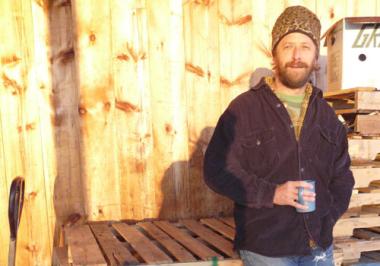It's 7:30 on a cold morning in Hatfield, maybe the fifth day of real frost we've had. The guys are cleaning squash in the sorting room in the barn and you can see their breath. During my interview with farmer Dave Jackson, the conversation turns to the weather almost every?10 minutes.
"Temperature 33.8!" says Jackson's CSA manager. Later, after he checks out the greenhouses and the fields and the positioning of some equipment scattered about the fields, Jackson consults with his workers about last night's Red Sox game.
Upstairs in an office littered with pictures of kids, computer stuff and a music stand with a banjo propped up against it, we talk farming, retail, consumerism, economy of scale, the price of ballet lessons and his new venture, a year-round CSA. This is big news in the local food scene. A blog posting about his new venture drew fire from another farmer protesting Jackson's calling his place a CSA (Community Sponsored Agriculture) which is typically defined as a farm in which individuals will become shareholders in the harvest. This has evolved since the '80s to the selling of other farms' crops as well as local dairy and meats at CSAs.
Jackson's offer to the public is to provide his own winter-grown lettuce greens, local root veggies, citrus, tomatoes and green beans from the South, free coffee and some down home entertainment all year long. CSAs typically offer shareholders a piece of the action for several hundred dollars a season in return for locally grown food; Jackson's venture is a bit different. He believes that most people aren't going to root cellar anything and that buying a tomato trucked in by him from Florida beats shopping at a soulless store where nobody knows your name.
"We were talking about going local in the '70s, and now we're coming full circle where it matters again. You want change? We're providing a club where you can be part of the change," he says of his new venture, a year-round CSA that will give shareholders access to his salad greens and other food right there in the barn. No displays, no magazine racks, no middleman. "Don't wait for Wall Street because it's not going to happen," he says.
Jackson has the 1,000-yard stare of a man who looks at frost and sees baby bok choy. In conversation, he tends to jump around: "Eating locally is the Manny Ramirez of this trend. What about the local economy?" What about it?
"Somebody said that farmers are the new rock and roll stars, but I think that people just want to put a face to the farmer," says Jackson. With rows and rows of vegetables that are planted and harvested from early spring to late fall, the farm is planted on the New England schedule, but Jackson wants to change that. "It's not just locavores, it's everybody," he says. "They all want to eat local food—and why not?—all year round." Jackson adds that a lot of other area farmers want to extend their growing season.
Jackson's newly appointed CSA manager, Benneth, rushes into the room. She is about 24. "Dave! It's 33.7. What should we do with the fennel?" she asks. "Put the thermometer in the ground,"says Dave, and she rushes back out. "I don't know how frost-hardy fennel is," says Jackson "We're a kale and collard and leeks farm. I'll have to reread the genus of the crop."
Jackson is one of the early organic growers in the Valley. In 1983, he worked for Bill Hewitt at the Funny Farm, which became certified by NOFA (Northeast Organic Farmers' Association) to distribute to Bread and Circus (later acquired by Whole Foods Market) and co-ops. Several years later Jackson started Enterprise Farm, which grew into a 75-acre operation that grows and distributes its own produce and the food of other growers to stores such as Whole Foods and, as of 2007, customers at the barn on River Road.
Last winter, Enterprise's Winter Farmers' Market sold root veggies, dairy, bread, and citrus fruits and vegetables trucked up here from the South. Jackson decided to expand on the experiment with a full-out year-round CSA. The semantics of the local food trend are evolving. Responding to the charge that his enterprise at Enterprise is not a CSA since some of the food it will be selling is not local, Jackson says, "For a while we were going to call it an RSA (Regionally Sponsored Agriculture)," although Massachusetts and Florida are in the same region the way Birkenstocks and Manola Blaniks are in the same region.
Brookfield Farms in Amherst is the only year-round CSA in the area and has been selling locally grown food to shareholders since 2004. It has 300 members and a waiting list. The fact that almost every CSA in the region has a waiting list is one of Jackson's market indicators that his venture is going to?find some customers.
"Come on," he says. "At the end of the season, everybody is heartaching about no more CSA. They want to come out to the farm to get the food, see what's going on and get a dialogue going. That's why we're going to put a rug down and have a couch, to get some talking done."



